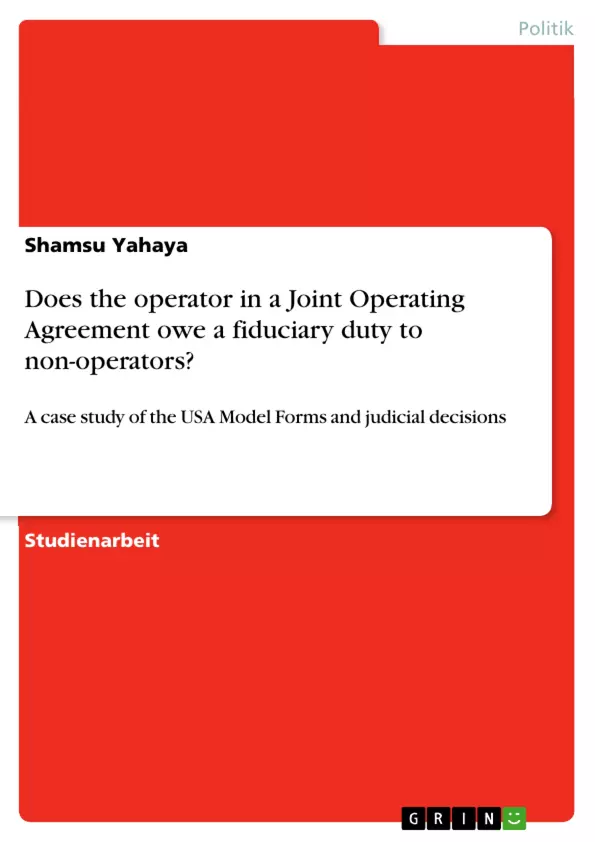The classification of the operator’s relationship with the non-operators in a Joint Operating Agreement is an issue that deserves some scrutiny. Is the operator a fiduciary or not? In an attempt to answer this question, this paper will take a case study of the United States model Joint Operating Agreement forms and undertake an analysis of judicial interpretations and approaches to the provisions in the Model Forms regarding the duties and liabilities of operators. Both Common Law and Equity have classically imposed fiduciary duties on trustees and agents. The courts, as we shall see, have, however rendered different connotations in ascertaining the operator’s duties despite the clear language used in the Model Forms exempting the operator from fiduciary obligations. The conclusion at the end will highlight the position of the law in other jurisdictions outside the USA.
Inhaltsverzeichnis
-
Kapitel 1 Einführung
- 1.0 Einführung
-
Kapitel 2 Bedeutung von treuhänderischen Pflichten
- 2.1: Was ist eine treuhänderische Pflicht?
- 2.2: Bedeutung von treuhänderischen Pflichten
- 2.3 Treuhänderische Pflichten in Joint Ventures
-
Kapitel 3 Die Modellformvereinbarungen
- 3.1 Eine Analyse der Modellformvereinbarungen
- 3.2 Modellformen und Pflichten der Parteien
-
Kapitel 4 Entscheidungen der Rechtsprechung
- 4.1 Fälle, in denen die Gerichte treuhänderische Pflichten feststellen
- 4.2 Fälle, in denen die Gerichte mit den Modellformen übereinstimmen
Zielsetzung und Themenschwerpunkte
Diese Forschungsarbeit untersucht die Frage, ob der Operator in einem Joint Operating Agreement (JOA) gegenüber den Nicht-Operatoren eine treuhänderische Pflicht schuldet. Der Fokus liegt dabei auf der Analyse der US-amerikanischen Modellformvereinbarungen und der gerichtlichen Interpretationen der darin enthaltenen Bestimmungen über die Pflichten und Haftungen von Operatoren.
- Definition und Bedeutung von treuhänderischen Pflichten im Rahmen von JOAs
- Analyse der relevanten Klauseln in den US-amerikanischen Modellformvereinbarungen
- Untersuchung der Rechtsprechung in den USA zu den Pflichten des Operators
- Bewertung der unterschiedlichen Interpretationen der Modellformen durch die Gerichte
- Einordnung der Rechtslage in anderen Jurisdiktionen außerhalb der USA
Zusammenfassung der Kapitel
Kapitel 1 Einführung
Dieses Kapitel bietet eine Einleitung in die Thematik der Joint Operating Agreements (JOAs) in der Öl- und Gasindustrie. Es stellt die Bedeutung von Modellformvereinbarungen für die Branche heraus und gibt einen kurzen Überblick über die Entwicklung der AAPL- und AIPN-Modelformen.
Kapitel 2 Bedeutung von treuhänderischen Pflichten
Kapitel 2 beschäftigt sich mit der Definition und Bedeutung von treuhänderischen Pflichten im allgemeinen Recht. Es erläutert die Voraussetzungen für die Entstehung einer treuhänderischen Beziehung und die spezifischen Pflichten, die mit ihr verbunden sind.
Kapitel 3 Die Modellformvereinbarungen
Kapitel 3 analysiert die US-amerikanischen Modellformvereinbarungen für Joint Operating Agreements und untersucht die darin enthaltenen Regelungen zur Haftung und zu den Pflichten des Operators. Es wird insbesondere auf die Frage eingegangen, ob die Modellformen den Operator von treuhänderischen Pflichten befreien.
Kapitel 4 Entscheidungen der Rechtsprechung
In Kapitel 4 werden die relevanten Gerichtsentscheidungen in den USA beleuchtet. Es werden Fälle vorgestellt, in denen die Gerichte die Modellformen unterschiedlich interpretiert haben und die Pflichten des Operators unterschiedlich bewertet haben.
Schlüsselwörter
Joint Operating Agreement, treuhänderische Pflicht, Operator, Non-Operator, Modellformvereinbarungen, US-amerikanische Rechtsprechung, Rechtsvergleichung.
- Quote paper
- Shamsu Yahaya (Author), 2009, Does the operator in a Joint Operating Agreement owe a fiduciary duty to non-operators?, Munich, GRIN Verlag, https://www.grin.com/document/141861



